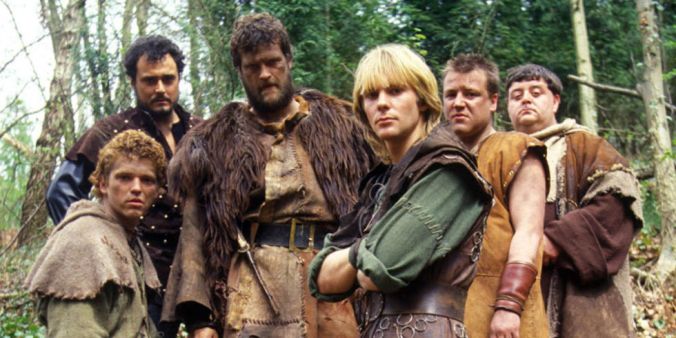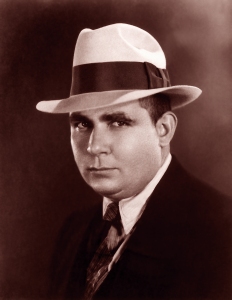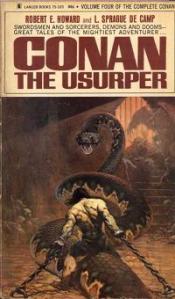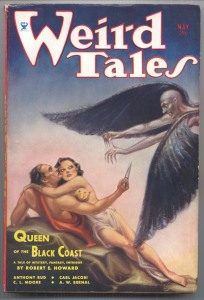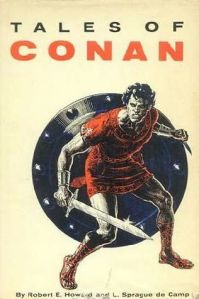Here’s a story recently shovelled from the depths of my mind-bucket. It was supposed to be set in The World Apparent, the fantasy universe I co-created with Martin Bolton (he made the tea and encouraging noises) but turned into something else and now I don’t really know what it is or where it is set. However, here the thing is, served up for your entertainment gratis and free of charge, you lucky trolls.
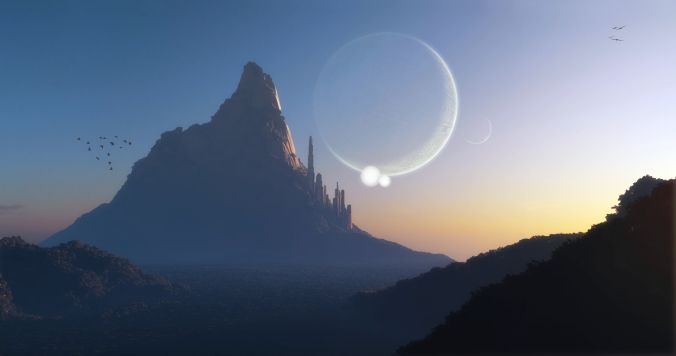
The One Lord
by David Pilling
In that summer, the worst of summers, the Jackal clan came down onto the plains. The mountains were their ancestral home, but they had little choice. They were being hunted again, and this time their hunters had more than sport in mind: nothing less than the total extermination of all the Half Blood peoples was their goal.
The Jackals were lucky. They had wise elders, and a capable chief of mature years who knew when to fight and when to run. Their cousins were not so ably led. The skies over the Frostfall Mountains were bruised with the smoke of burning villages, the high forests strewn with butchered corpses.
“The ironmen have learned to fight properly,” remarked Silver Hide, the Chief Jackal, as he crouched on his haunches by the campfire one night. The fire was kept low in case the light should attract hunters. They had reached the fringe of the Wide Plains, a vast expanse of moor and desert, with the rugged silhouette of the Frostfalls marching away to the west.
The lesser chiefs and elders around him stared bleakly into the flames. Only a handful were left now. Their brothers were all gone, slain by ironmen blades or the cholera that always stalked their homelands at this time of year.
“Silver Hide speaks truth,” growled Broketooth, the bravest of them, a grizzled old fighter with a mouthful of broken teeth and a knife-scar where his left eye used to be, “some traitor among our own folk must have gone to Silverback and taught the whiteskins our way of war.”
He stabbed a grimy, broken-nailed finger at the ground. “In the old days the ironmen didn’t know how. They rode or walked into our mountains in neat little lines, and we used to shoot them down from the cliffs. When their numbers were thinned out, we would rush down from the heights and carve up the survivors. That was the way of it. Not now.”
Silver Hide nodded ruefully. The Frostfalls were spotted with the rotting remains of earth and timber forts, thrown up by the ironmen of past generations. They had sent army after army into the mountains, lumbering hosts of arrogant fools in metal suits, stuck up on big horses, and footmen armed with long spears and heavy crossbows. Deadly on the lowlands, their weapons were virtually useless in the mountains.
The chieftain stroked his plaited beard. It had taken the ironmen many generations, many defeats, to change their strategy. Now the One Lord of the Black Tower sent armies of light horsemen and fleet-footed archers armed with longbows against the Half Bloods, led by cunning and determined generals, as sly as they were merciless.
“Everything changed when the One Lord took power,” he said in his deep, throaty voice, “before that, the ironmen had left us alone for years. What use are our damp forests and mud huts to them? We have no wealth. There is no precious metal to be mined in the Frostfalls.”
“They want us gone,” said one of the elders in a high, whistling voice, “we are brute beasts to them. Our very existence is an offence. A stench in their nostrils. We are a reminder that other people held sway in this world before they crawled from the pits of Hell. An earlier folk. A nobler folk.”
The elder stretched out his long, stringy arms. “My children, we are the last of the first. Once we are gone, nothing will remain save a few ancient graves, broken pots and the like. The rubbish of history.”
Shortly before dawn, the Jackals moved on. Silver Hide knew he couldn’t afford to rest in one place for too long. His hope – a last, desperate hope – was that the bands of ironmen hunters wouldn’t think to come down from the mountains in search of prey. No Half Blood clan had ever dwelled on the inhospitable plains, and no wonder. The soil was poor, the game virtually non-existent.
“Three months,” Silver Hide whispered to himself one morning, as he stared at his reflection in a pool of clear water. After wandering for several days through trackless, icy waste, the Jackals had come to a slightly more fertile region, watered by a network of shallow streams.
“Three months,” he repeated, “let us hold out in this wilderness for that time. Let the ironmen stay in the mountains, and not think to look for us here. When the snows come it will be safe to return. None save the Half Bloods can survive in the Frostfalls in the depths of winter.”
Or so he hoped. Silver Hide peered closer at his reflection. Compared to the tall, pale-faced ironmen – or ‘whiteskins’, as his folk sometimes called them – he was a dark, stunted creature. His heavy shoulders were matted with silvery fur (hence his name) his eyes small and sunken inside deep sockets, his jaw heavy, with a pronounced underbite. Enormous strength dwelled inside those shoulders and the long, well-muscled arms, ending in powerful hands and curving yellow nails.
He wore a simple deerskin jacket, padded with straw, and for weapons carried a serrated bone dagger and an axe with a jagged flint head. Unlike their enemies, his people had never discovered the secret of iron.
Ape-men, they call us, he thought, relics of a bygone age. Fit only to serve as slaves, or to be wiped out. They hunt us with dogs, as though we were animals, like the deer and the wild boar.
His grim thoughts were shattered by the cry of a horn, rising from a patch of woodland to the south. The trees covered a rocky slope leading down to a ravine, where the Jackals had made their camp for the night.
Silver Hide had heard that cry before, many times. A war-horn, sounded by the ironmen before they charged into battle. He spun around and loped towards the scattered collection of rough hide shelters and bivouacs beside the stream.
“Move!” he shouted, “get into cover! They have found us!”
His people, women and children among them, spilled out of their tents and fled for the cover of the woods beyond the northern bank. The young fighters snatched up their weapons and ran to join their chief. The horn rang out again, a piercing wail, this time much closer. The ground shook under a flurry of racing hoofs,
“Curse our scouts,” spat Brokentooth, “what are they doing, trimming their arse hairs?”
He soon had an answer. A wave of armed horsemen in iron helms and ringmail exploded out of the woods. Their white tunics were emblazoned with the black sword of the One Lord. The foremost of them carried spears. Every spear was decorated with the severed head of a Jackal scout.
Silver Hide could do little to prevent the massacre that followed. The ironmen knew their work. Their band split in two. Half their number charged his warriors, while the other half skirted the ravine and plunged after the fugitives in the woods.
“Sell your lives!” he roared, hurling his axe. It clanged off a round shield. He reached for the bone knife stuck into the sash at his waist. Too late. An ironman thundered towards him. The polished head of a mace flashed in the soldier’s hand. It swung down and thumped against Silver Hide’s brow.
His skull exploded with pain. A gout of hot red blood splattered across his eyes. Then all was darkness.
***
He awoke to agony, and the slaughter of his people. While he slumbered the Jackals had been wiped out, butchered to the last child. Silver Hide struggled to his feet and wandered among the dead. His head was on fire. Warm blood mingled with salt tears trickled down his cheeks as he searched in quiet desperation for any survivors.
There were none. At last, after he had wept over the dismembered corpse of She-Who-Walks-In-Moonlight, the woman he had intended to marry, a black rage fell upon him. All his pity and grief and despair quickly shrivelled away. The bereaved chieftain, the last of his race, now lived only for revenge.
“Gods above and below,” he begged, falling to his knees, “you have taken everything I loved – home, family, clan, the future mother of my children – and left me with nothing save a blood-debt. Grant me revenge, I beg you. Let me come within striking distance of my enemy. Just one blow is all I need. One blow to slay the One Lord.”
The gods didn’t answer. They never did. Silver Hide cursed them, and set out on his hopeless quest. According to the legends of his folk, the Black Tower lay somewhere to the east. Far, far away. No Half Blood had ever seen it with their own eyes, save those taken as slaves by the ironmen. None of these luckless souls ever came home again.
Once, Silver Hide would have condemned any effort to reach the Black Tower as a fool’s errand. Now he set out alone to find it. Fresh tears coursed down his face as he stripped the dead of food and water and clothing, all he would need for the journey ahead.
“I am sorry,” he said to each of the corpses in turn. “Sorry for failing to protect you. Sorry for robbing you. When my task is done, and the One Lord lies dead, I shall cut my throat and apologise in person to your shades.”
The lone figure struck out east, delving blindly into the unknown. For days he saw no other living creature. For days he trudged wearily across a seemingly endless grey desert under bone-white skies with ragged stretches of black cloud. The land degenerated into waste, a sterile desert where nothing grew or lived.
Silver Hide kept his eyes fixed on the stark horizon, sustained by the bread and water he had taken from the dead. After three days he began to encounter signs of life, nature fighting back against the desolation. He almost cried out at the first sight of a tough, wiry plant with purple leaves, sprouting defiantly through the dusty grey soil. The plants became ever more frequent, more lush, until he found himself traipsing through fertile countryside. He followed a thin stream, ziz-zagging its way through the undergrowth, and thanked the gods – and his luck – when the roar of rushing water sounded in the distance. The stream flowed into a river, deep and wide and driven by a powerful current. Silver Hide refilled his empty skins in the cold, foam-flecked waters and then wallowed naked in the shallows.
A scream, adruptly cut off, made him scramble to the bank. He dragged on his clothes, snatched up his axe and looked around wildly for its source. His heart skipped as he heard another cry. The same voice, raised in anguish:
“Help – help me! Mother of Mercy, I cannot bear it! Gods above, Gods below, help me!”
The wail died away. It had come from the trees to the west. Silver Hide padded soundlessly through the wood, axe in one hand, knife in the other. Raised since childhood to move in swift silence through the forests of his homeland, he kept low, peering cautiously ahead.
The trees ended in a roughly circular clearing, dominated by a grey tower on a green mound, surrounded by a deep ditch. Silver Hide gazed in awe at the square pile of masonry, rising high above his head, higher than the tallest trees. He had heard stories of how the wealthiest ironmen lived in the east, of their grand palaces of stone and gold and iron, but never seen one for himself. The strongholds they built in the Frostfalls were crude mounds of earth and timber. Even the largest was barely half the size of this towering bastion.
“Help…please…help…”
The cry echoed through the clearing. Again the same voice, wracked with pain. It came from somewhere inside the tower. Silver Hide, who had heard men die before, recognised the pain and desperation. Whoever the voice belonged to did not have long to live.
Silver Hide loped around the northern side of the tower. He froze at the sight of dead men strewn over the grass. Soldiers in iron helms and ringmail, wearing brightly coloured coats splashed with blood. Some wore coats painted with golden eagles against a black field, a symbol Silver Hide didn’t recognise. The rest wore the black sword and white tunics of the One Lord.
He wandered carefully over the battlefield, trying to piece together what had happened. At the foot of the tower there was a door of cross-grained black oak. The door had been flung open, and a bridge of planks lowered over the ditch. He guessed the soldiers inside the tower had charged out to fight. The result was a bloody stalemate with no victors.
Over forty men lay dead. Silver Hide found the slaughter difficult to understand. Why were the ironmen filled with such hatred? Why were they compelled by the urge to conquer, to destroy, to tear their fellow man to pieces? Their ancestors must have committed some great evil and been cursed by the gods as a result.
He jumped as cold fingers clutched feebly at his ankle. “Please…” whispered a voice he recognised, now drained of strength, “a little water…please…”
Silver Hide crouched beside the dying soldier. A young man, barely twenty summers, handsome under his scrubby yellow beard. He wore the golden eagle on his coat, and the light in his soft blue eyes was fast fading. His lifeblood oozed from a great wound in his belly, torn open by a barbed spear. The spearhead was still lodged in the wound.
“Here,” said Silver Hide, putting his waterskin to the lad’s parched lips, just enough to moisten them.
The dying man’s eyes struggled to focus on him. “Are you…” he whispered, “are you for the One Lord, or against?”
“Against,” Silver Hide replied instinctively, “I mean to kill him. I will kill him.”
“Then I wish you joy, friend…”
The soldier coughed blood. His eyes took on a glassy, unseeing quality. Silver Hide watched him die, and then got up and searched the battlefield for anything useful. He had always wanted to own an ironman sword. He found one to his liking, cleaned the blood off the blade with a wisp of grass and stuck it into his sash. After some hesitation, he also took an iron helmet with a visor and a round shield.
He pushed on into the east, deeper into enemy territory, his mind full of what he had seen and heard. It seemed the ironmen were at war with each other, civil war, which might explain why few of their chieftains – or knights as they called themselves – had come to the Frostfalls in recent times. Silver Hide was not surprised. If the One Lord was as cruel to his own people as he was to the Half Bloods, no wonder they had risen against him.
“Don’t let an ironman blade strike him down,” Silver Hide muttered as he hurried through the emerald green forest, “he is mine to kill. Mine.”
The prospect of an eternity of shame drove him on. If the One Lord was slain by another hand, then Silver Hide would have failed in his quest. When he died, and was transported to the Beyond where the shades of his clan dwelled, they would refuse to accept him. His soul would be banished, to wander the dreary wastes of the afterlife forever, dishonoured and despised and utterly alone. Among the Half Bloods, to fail in life was to be punished in death.
Days passed. The forests petered out and he found himself wandering across farmland, wide stretches of cultivated fields dotted with settlements. Yet all was desolation. Crops were left to rot in the fields, farmsteads burned, villages empty and weed-grown. Deer cropped grass in the streets, roofless houses gaped at the sky. Clouds of flies buzzed about the bodies of men, women and children, stripping the flesh from their bones. The survivors, if there were any, had fled.
Silver Hide gave the dead a wide berth and hurried on. Once he passed a castle, an awesome pile of high towers and battlemented walls like rows of grey teeth, rearing on a crag high above a river valley. The gates were shut, and he thought the sun glinted off helmeted heads on the walls. Perhaps some ironman chief still dwelled there with his folk, cowering inside their stone prison.
After seven days and nights, footsore and weary in heart, mind and body, he arrived within sight of the Black Tower. In truth it was no tower at all, but a mountain, a lone peak of black rock rising high above the plains. Though it was summer, layers of ice glimmered on the mountain’s upper slopes.
Silver Back shuddered. The Black Tower was said to be an unnatural place, where the laws of nature were twisted and manipulated by the evil creatures that dwelled inside. His childhood nightmares were stalked by them, hideous red-eyed monsters in black cowls, employing the darkest of forbidden arts to shape the world to their purpose.
He thrust aside his fear. Stories, he thought, foolish tales, recited by the Jackal elders to scare infants. There is only one evil inside the mountain. I shall destroy him.
There were no signs of life outside the mountain. Silver Hide advanced towards the great gates, visible from a mile distant, twenty feet high and forged of steel. He drew his sword, expecting the gates to yawn open and disgorge hundreds of ironmen lancers on their heavy horses. If he could kill one, just one, before going down under their hoofs, at least his soul might not be totally dishonoured.
The gates remained shut. The rugged grandeur of the mountain loomed overhead. He shaded his eyes and peered up at the stone ramparts and watchtowers carved out of the rock. White pennons bearing the black sword flew from the towers, but they appeared to be unguarded.
Finally, he stood before the double set of gates. Fighting down a surge of panic, he reached out and laid his right hand flat against cold steel. He gave a gentle push, and the gate swung inwards without a sound.
Beyond lay shadow. “Gods of wind and water, earth and sky defend me,” Silver Hide whispered. He stepped inside.
The passage inside was large and airy and led through into a huge circular chamber, well-lit by shafts carved out of the rock. Silver Hide paused to gape in wonder at the vastness of the space, ten times the size of his smoky timber hall back in the Frostfalls.
He froze. There were a dozen arched doorways leading out of the chamber. Every one was guarded by a pair of guardsmen in shining plate and ringmail. Their white coats bore the sigil of the black sword.
Silver Hide dropped into a fighting crouch, sword in one hand, bone knife in the other. The guards carried halberds, wickedly sharp chopping blades mounted on long poles. If they all rushed him at once, the last of the Half Bloods knew he would be swiftly carved to pieces.
“Well?” he shouted, his voice tinged with fear, “why do you wait? Come at me!”
Still the guards didn’t move. They might have been statues, still and lifeless. Silver Hide warily approached the nearest, reached out with his sword and flipped up the man’s visor.
The face inside was pale, bearded and immobile, as if made of stone. Only the eyes, wide and staring and full of terror, betrayed any sign of life.
Silver Hide sheathed his knife and prodded the guard’s armoured chest. “You can’t move,” he said, “yet you live. Witchcraft.”
He moved closer to stare deep into those frightened eyes. “I could slit your throat,” he breathed, “and you would be powerless to stop me. I could slit all your throats. But I am after the shepherd, not the sheep.”
Silver Hide chose a door at random and padded through it, deeper into the mountain. He delved into a maze of spiral stairs, narrow corridors and massive vaulted rooms. The Black Tower was full of people, knights and guards and servants, all transformed into living statues. Intent upon his prey, Silver Hide ignored them, ignored the rich furnishings and elaborate tapestries and wall hangings. In one of the largest halls he found a group of men – there were no women in the Black Tower, save for a few kitchen maids – seated at some long benches. Their dinner had long since gone cold. Flies buzzed about the meat, hands were frozen halfway to grasping a loaf of bread or cup of wine.
“I have come to kill your master,” Silver Hide roared at them, “I will kill him! I will glory in his blood and smear it over your faces!”
At last, after what seemed like hours of blundering about this grand wilderness of stone, he stumbled into a chamber with a domed roof. The walls were bare and painted white, the floor paved with red and black tiles. There were no guards present.
His heart quickened. The only furnishing was a raised wooden dais, and on the dais was a tall black chair. Behind the dais there was an enormous window of tinted glass, through which the last rays of the evening sun filled the room with spectral red light.
There was a figure sat in the chair, silhouetted against the light. Another statue. Silver Hide padded slowly towards the dais, straining to make out the statue’s features.
“So you have come,” said a deep, unearthly voice, “the lone hero has overcome all his trials, and now faces the dark lord in his tower.”
The voice echoed and re-echoed weirdly inside Silver Hide’s head. His fingers were damp with sweat as they tightened on the grip of his sword.
“Come closer,” said the voice of the One Lord, “I shall not harm you.”
Buffeted by waves of fear, anger and confusion, Silver Hide loped a few steps closer to the dais.
He had expected a demonic creature in flowing black robes, red eyes blazing inside a helm of black iron. Instead he saw a surprisingly young man garbed in a plain white tunic, a belt with a silver buckle and soft buckskin shoes. His face was thin and hollow-eyed and leeched of colour, his hair cropped in military style. There was a tension about him, as though he fought against some inner pain..
And he was unarmed. Silver Hide measured the distance between him and the chair. A few more steps…a sudden leap…his quest would be over.
“Not yet,” said the One Lord, “I sense your eagerness. Your lust for my blood. You must be patient.”
“Die!”
Silver Hide sprang. The One Lord raised his left hand, palm upwards, and curled the fingers slightly. Silver Hide found himself suspended in mid-air, unable to move a muscle, held in the grip of some tremendous force.
He tried in vain to work his jaw, to spit a curse at the creature in the chair. Not a sound emerged.
“If I snapped my fingers,” said the One Lord in a calm, almost gentle voice, “I could stop your heart. I have that power. It would be easy. So very easy.”
“I could have killed you long before now,” he added, “I watched the massacre of your clan. I watched you traipse all the way across the Wastes. Even from such a distance, I could feel the heat of the rage in your heart. Such passion! I watched you at the stone keep, wandering among all those dead fools. I could have killed you at any time.”
He relaxed his fingers slightly. “You may speak.”
Silver Hide suddenly regained control of his voice. “Kill me,” he rasped, fighting back tears, “if you are so powerful, why prolong my agony? What joy can you take from such pointless cruelty? Make a clean end.”
The One Lord shook his head. “No,” he said sadly, “we both have a duty to perform. Death will soon release me, but you must carry the burden for a good while longer.”
“Listen. I had great hopes, once. I wanted to use the power I was born with to change the world for the better. I should have remembered the old lesson. Power corrupts. Always. Little by little, I found myself sliding into evil.”
“My own people turned against me. I allowed them to raise armies and slaughter each other, simply for amusement. I could not stop myself. I started as a knight, a simple man who wanted to do good. Now I am the One Lord, the hated villain sitting in his mountain lair, waiting for a hero to come and slay him. Fate has marked us out, my friend.”
He smiled thinly at Silver Hide. “The universe demands balance. There is always a villain. Always a hero. Why do you think I bewitched my followers? You were allowed to come here. I am tired of this role I have been forced to play.”
The unseen power gently lowered Silver Hide to the floor. Then it was gone. He could move his limbs again. Speak. Act.
He leaped up the steps of the dais and rammed his sword, point-first, into the One Lord’s thin breast. His enemy shuddered violently. Bright red blood spurted from the wound and splattered over the tiles.
The One Lord’s lips were spread wide in a ghastly smile. More blood coloured his teeth and dripped down his beardless chin.
“Thank the gods,” he whispered, “thank the gods…”
Silver Hide planted both hands on the hilt and worked his sword in deeper. He wanted to hear the One Lord scream. Beg for mercy.
The dying man said nothing more. His body went limp. The red light pouring through the window gradually intensified. Within seconds it was the colour of blood. A great heat entered the room, filling it up like a steam-bath. Silver Hide cried out in pain and curled up beside the chair.
His entire body was on fire. He was burning, burning, the flesh stripped from his living body.
“Let me go,” he rasped, “let me die.”
No. You have a duty to perform.
The One Lord’s hateful voice sounded distantly inside his head. Silver Hide flung his head back and screamed.
In a moment, a heartbeat, all was normal again. The One Lord sat in his chair of carved black wood, contemplating a map of the world spread out on the floor below the dais. Six of his knights stood nearby, anxiously awaiting his commands.
“All this must be ours,” said the One Lord, once a Half Blood chieftain known as Silver Hide, now transformed into his greatest enemy, “all the world shall bow to my will. This is my purpose.”
He had few memories of his former self. Even these were fast dwindling. Yet he could hear a faint voice, deep inside the winding chambers of his mind.
“Now you must play the role, my friend…”
END
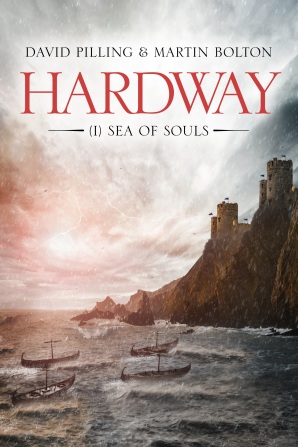


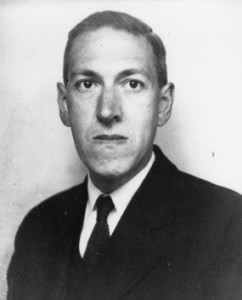
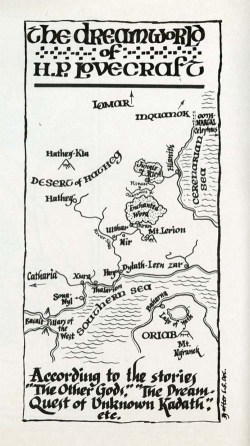
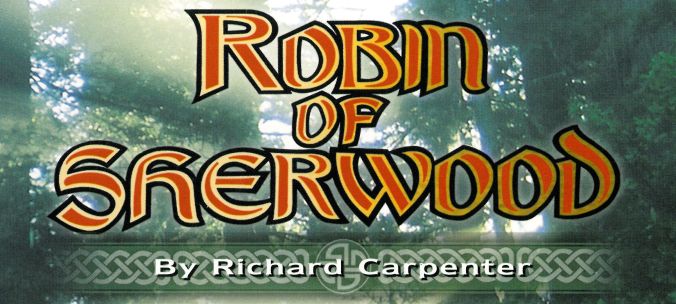
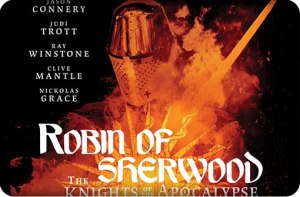
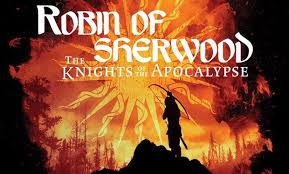 So to Robin Hood and the KOTA. Before I go any further, I should acknowledge the huge degree of love and care and effort that went into this project. It was no mean feat on the part of Barnaby Eaton-Jones and his friends at Spiteful Puppet to gather all the surviving cast, raise the money needed to fund the recording (via crowdfunding), as well as hack through the legal jungle simply to persuade ITV (who own the rights to the series) to allow the project to go ahead. Also worth mentioning is that all the money raised from sales of the recording will go to charity.
So to Robin Hood and the KOTA. Before I go any further, I should acknowledge the huge degree of love and care and effort that went into this project. It was no mean feat on the part of Barnaby Eaton-Jones and his friends at Spiteful Puppet to gather all the surviving cast, raise the money needed to fund the recording (via crowdfunding), as well as hack through the legal jungle simply to persuade ITV (who own the rights to the series) to allow the project to go ahead. Also worth mentioning is that all the money raised from sales of the recording will go to charity.